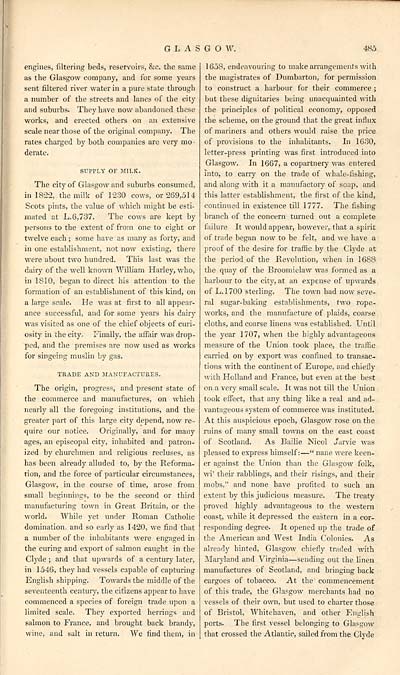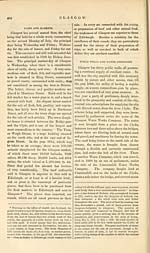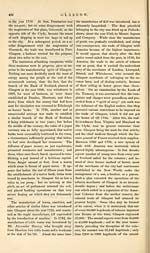Gazetteer of Scotland > Volume 1
(521) Page 485
Download files
Complete book:
Individual page:
Thumbnail gallery: Grid view | List view

GLASGOW.
485
engines, filtering beds, reservoirs, &c. the same
as the Glasgow company, and for some years
sent filtered river water in a pure state through
a number of the streets and lanes of the city
and suburbs. They have now abandoned these
works, and erected others on an extensive
scale near those of the original company. The
rates charged by both companies are very mo-
derate.
SUPPLY OF MILK.
The city of Glasgow and suburbs consumed,
in 1822, the milk of 1230 cows, or 269,514
Scots pints, the value of which might be esti-
mated at L. 6,737. The cows are kept by
persons to the extent of from one to eight or
twelve each ; some have as many as forty, and
in one establishment, not now existing, there
were about two hundred. This last was the
dairy of the well known William Harley, who,
in 1810, began to direct his attention to the
formation of an establishment of this kind, on
a large scale. He was at first to all appear-
ance successful, and for some years his dairy
was visited as one of the chief objects of curi-
osity in the city. Finally, the affair was drop-
ped, and the premises are now used as works
for singeing muslin by gas.
TRADE AND MANUFACTURES.
The origin, progress, and present state of
the commerce and manufactures, on which
nearly all the foregoing institutions, and the
greater part of this large city depend, now re-
quire our notice. Originally, and for many
ages, an episcopal city, inhabited and patron-
ized by churchmen and religious recluses, as
has been already alluded to, by the Reforma-
tion, and the force of particular circumstances,
Glasgow, in the course of time, arose from
small beginnings, to be the second or third
manufacturing town in Great Britain, or the
world. While yet under Roman Catholic
domination, and so early as 1420, we find that
a number of the inhabitants were engaged in
the curing and export of salmon caught in the
Clyde ; and that upwards of a century later,
in 1546, they had vessels capable of capturing
English shipping. Towards the middle of the
seventeenth century, the citizens appear to have
commenced a species of foreign trade upon a
limited scale. They exported herrings and
salmon to France, and brought back brandy,
wine, and salt in return. We rind them, in
1658, endeavouring to make arrangements with
the magistrates of Dumbarton, for permission
to construct a harbour for their commerce ;
but these dignitaries being unacquainted with
the principles of political economy, opposed
the scheme, on the ground that the great influx
of mariners and others would raise the price
of provisions to the inhabitants. In 1630,
letter-press printing was first introduced into
Glasgow. In 1667, a copartnery was entered
into, to carry on the trade of whale-fishing,
and along with it a manufactory of soap, and
this latter establishment, the first of the kind,
continued in existence till 1777. The fishing
branch of the concern turned out a complete
failure It would appear, however, that a spirit
of trade began now to be felt, and we have a
proof of the desire for traffic by the Clyde at
the period of the Revolution, when in 1688
the quay of the Broomielaw was formed as a
harbour to the city, at an expense of upwards
of L.1700 sterling. The town had now seve-
ral sugar-baking establishments, two rope-
works, and the manufacture of plaids, coarse
cloths, and coarse linens was established. Until
the year 1707, when the highly advantageous
measure of the Union took place, the traffic
carried on by export was confined to transac-
tions with the continent of Europe, and chiefly
with Holland and France, but even at the best
on a very small scale. It was not till the Union
took effect, that any thing like a real and ad-
vantageous system of commerce was instituted.
At this auspicious epoch, Glasgow rose on the
ruins of many small towns on the east coast
of Scotland. As Bailie Nicol Jarvie was
pleased to express himself: — " nane were keen-
er against the Union than the Glasgow folk,
wi' their rabblings, and their risings, and their
mobs," and none have profited to such, an
extent by this judicious measure. The treaty
proved highly advantageous to the western
coast, while it depressed the eastern in a cor-
responding degree. It opened up the trade of
the American and West India Colonies. As
already hinted, Glasgow chiefly traded with
Maryland and Virginia — sending out the linen
manufactures of Scotland, and bringing back
cargoes of tobacco. At the commencement
of this trade, the Glasgow merchants had no
vessels of their own, but used to charter those
of Bristol, Whitehaven, and other English
ports. The first vessel belonging to Glasgow
that crossed the Atlantic, sailed from the Clyde
485
engines, filtering beds, reservoirs, &c. the same
as the Glasgow company, and for some years
sent filtered river water in a pure state through
a number of the streets and lanes of the city
and suburbs. They have now abandoned these
works, and erected others on an extensive
scale near those of the original company. The
rates charged by both companies are very mo-
derate.
SUPPLY OF MILK.
The city of Glasgow and suburbs consumed,
in 1822, the milk of 1230 cows, or 269,514
Scots pints, the value of which might be esti-
mated at L. 6,737. The cows are kept by
persons to the extent of from one to eight or
twelve each ; some have as many as forty, and
in one establishment, not now existing, there
were about two hundred. This last was the
dairy of the well known William Harley, who,
in 1810, began to direct his attention to the
formation of an establishment of this kind, on
a large scale. He was at first to all appear-
ance successful, and for some years his dairy
was visited as one of the chief objects of curi-
osity in the city. Finally, the affair was drop-
ped, and the premises are now used as works
for singeing muslin by gas.
TRADE AND MANUFACTURES.
The origin, progress, and present state of
the commerce and manufactures, on which
nearly all the foregoing institutions, and the
greater part of this large city depend, now re-
quire our notice. Originally, and for many
ages, an episcopal city, inhabited and patron-
ized by churchmen and religious recluses, as
has been already alluded to, by the Reforma-
tion, and the force of particular circumstances,
Glasgow, in the course of time, arose from
small beginnings, to be the second or third
manufacturing town in Great Britain, or the
world. While yet under Roman Catholic
domination, and so early as 1420, we find that
a number of the inhabitants were engaged in
the curing and export of salmon caught in the
Clyde ; and that upwards of a century later,
in 1546, they had vessels capable of capturing
English shipping. Towards the middle of the
seventeenth century, the citizens appear to have
commenced a species of foreign trade upon a
limited scale. They exported herrings and
salmon to France, and brought back brandy,
wine, and salt in return. We rind them, in
1658, endeavouring to make arrangements with
the magistrates of Dumbarton, for permission
to construct a harbour for their commerce ;
but these dignitaries being unacquainted with
the principles of political economy, opposed
the scheme, on the ground that the great influx
of mariners and others would raise the price
of provisions to the inhabitants. In 1630,
letter-press printing was first introduced into
Glasgow. In 1667, a copartnery was entered
into, to carry on the trade of whale-fishing,
and along with it a manufactory of soap, and
this latter establishment, the first of the kind,
continued in existence till 1777. The fishing
branch of the concern turned out a complete
failure It would appear, however, that a spirit
of trade began now to be felt, and we have a
proof of the desire for traffic by the Clyde at
the period of the Revolution, when in 1688
the quay of the Broomielaw was formed as a
harbour to the city, at an expense of upwards
of L.1700 sterling. The town had now seve-
ral sugar-baking establishments, two rope-
works, and the manufacture of plaids, coarse
cloths, and coarse linens was established. Until
the year 1707, when the highly advantageous
measure of the Union took place, the traffic
carried on by export was confined to transac-
tions with the continent of Europe, and chiefly
with Holland and France, but even at the best
on a very small scale. It was not till the Union
took effect, that any thing like a real and ad-
vantageous system of commerce was instituted.
At this auspicious epoch, Glasgow rose on the
ruins of many small towns on the east coast
of Scotland. As Bailie Nicol Jarvie was
pleased to express himself: — " nane were keen-
er against the Union than the Glasgow folk,
wi' their rabblings, and their risings, and their
mobs," and none have profited to such, an
extent by this judicious measure. The treaty
proved highly advantageous to the western
coast, while it depressed the eastern in a cor-
responding degree. It opened up the trade of
the American and West India Colonies. As
already hinted, Glasgow chiefly traded with
Maryland and Virginia — sending out the linen
manufactures of Scotland, and bringing back
cargoes of tobacco. At the commencement
of this trade, the Glasgow merchants had no
vessels of their own, but used to charter those
of Bristol, Whitehaven, and other English
ports. The first vessel belonging to Glasgow
that crossed the Atlantic, sailed from the Clyde
Set display mode to: Large image | Transcription
Images and transcriptions on this page, including medium image downloads, may be used under the Creative Commons Attribution 4.0 International Licence unless otherwise stated. ![]()
| Gazetteers of Scotland, 1803-1901 > Gazetteer of Scotland > Volume 1 > (521) Page 485 |
|---|
| Permanent URL | https://digital.nls.uk/97430614 |
|---|
| Description | Volume I: Abbey to Glenartney. |
|---|---|
| Attribution and copyright: |
|
| Description | By Robert Chambers and William Chambers. Glasgow: Blackie & Son, 1838. 2 volumes. |
|---|---|
| Shelfmark | NF.1461.g.7 |
| Additional NLS resources: | |

